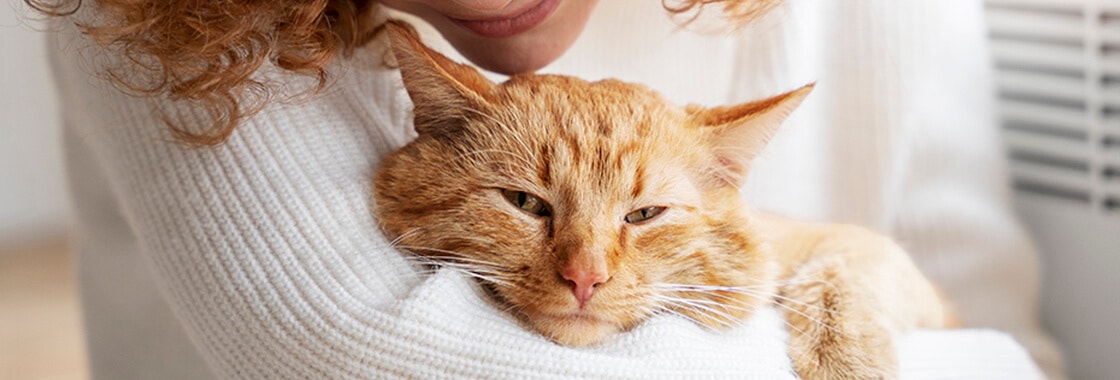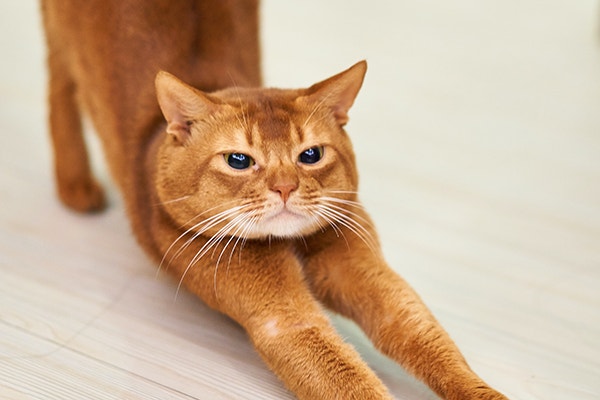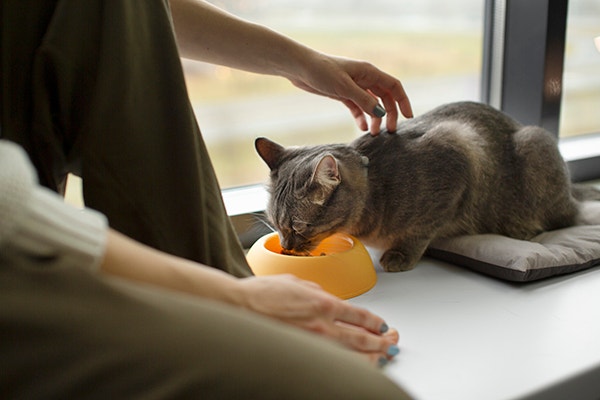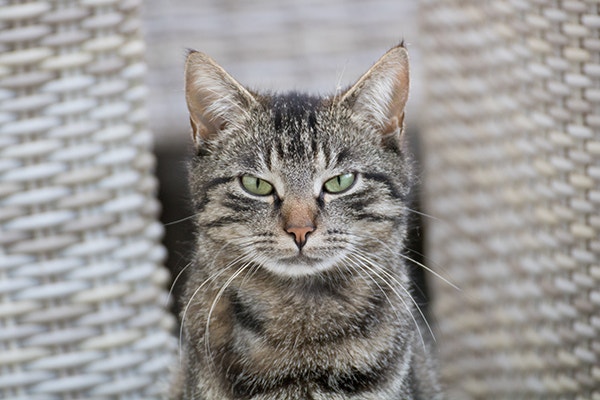- Homepage
- Blog
- Bonding & Care
- Clingy Cat
Understanding Clingy Cats


Share
As a cat parent, you probably have firsthand experience of your cat’s natural independent spirit. Sometimes your cat may feel loving towards you, and other times they may not want to know you at all! However, if you’re wondering why your cat is so needy, or if your cat is suddenly clingy, there may be something that’s causing their behaviour. While it can be difficult for you to go about your normal day with a cat under your feet at unexpected times, your cat may be experiencing anxiety, stress, or an underlying illness, which is manifesting as a needy cat.
In this article, we help cat parents understand their cat’s clingy behaviour. We look at the signs of a clingy cat and what may be causing your cat to be so clingy, as well as how to deal with the behaviour and when you may need to see a professional. It’s essential to look after your cat’s emotional needs to protect their overall well-being and help them thrive as healthy and confident cats.
What are some signs of a clingy cat?
Each cat is a unique individual, and while their temperaments may vary, cats show affection and love through common behaviours. This may include purring, kneading, rubbing against you or following you around the house. However, cats are also known to be independent creatures, particularly due to their hunting instincts. While some cats may be more affectionate, other cats may be more independent - but usually, cats display both traits, and it largely depends on their mood at the time!
If your cat has always craved your affection, this might just be a part of their personality. However, if your cat suddenly becomes more clingy, and this is a deviation from their usual behaviour, there may be something else going on. You’ll know if you have a clingy cat if they’re always following you around the house, constantly kneading or rubbing against you, sitting or sleeping on you at night, meowing loudly or knocking things down if you leave the room, or other destructive behaviours, such as scratching objects or not using their litter box as a way to get your attention.
We've listed the various possible reasons why your cat is being so needy below.
Changes in home environment
Cats thrive on routine, so any changes in their home environment can disturb them. This could be as simple as moving their litter tray to another location, or a new family member or pet that’s making them feel overwhelmed. Cats may be needy due to the changes, and feel more at ease near a familiar person.
Underlying medical illness
If your cat is suddenly clingy, this is less likely to be an abrupt change in personality and could possibly be a sign of feeling afraid (if something has frightened your cat), or of an underlying medical illness. If your cat is not feeling well, they are more inclined to seek out comfort from you - resulting in a clingy cat. A veterinary appointment can rule out any health issues.
Past trauma experience
Some cats are clingy from experiencing trauma in the past. For example, if your cat was separated from their mother or litter mates too early, they are more likely to cling to you for security. Also, if your cat came from an abused or neglected home, this could be why your cat is so clingy.
Stress or anxiety
Cats can experience stress or anxiety from changes in their routine or environment, other cats or pets in the household, another animal in their area, or any loud occurrences, such as a storm, firework display or nearby construction work. In these situations, your cat may be clingy to seek reassurance.
Boredom
A lack of mental or physical stimulation can cause boredom in cats, in which case they may look to you for constant entertainment. If your cat has nothing else to do apart from seeking attention from you, this could be another reason why your cat is so needy.
Emotional needs of cats
Cats have emotional needs that cat parents need to fulfil for their pet’s overall well-being. They value companionship, social interaction, love and affection and a sense of security. You can meet your cat’s needs by spending quality time with them. During this time, you could gently stroke them, play with them, use affectionate words and reward them with treats. This can help strengthen the bond between you both and provide your cat with the attention they need to make them feel happy, loved and safe.
If you’re not meeting your cat’s emotional needs, this may lead to an overly clingy cat who is desperately seeking your attention. This may also result in destructive behaviours as a way to get your attention or to prevent others from having your attention.
How to deal with a clingy cat?
You can deal with a clingy cat by ensuring you are caring for your cat physically, mentally and emotionally. As mentioned, cats love routine, and besides planning their meals, you can also schedule quality time together. This can help ensure you’re providing love and affection daily to meet your cat’s emotional needs. If your cat is still demanding attention after you’ve given it, try to keep some boundaries in place - otherwise, your cat will think they can get attention on demand. On a related note, if your cat keeps licking you, learn more on this behaviour.
You should also provide enriching activities to support your cat’s mental stimulation and keep them busy, instead of following you around all the time! Choose cat-safe toys that they can play with alone, such as a ping pong ball. Also, puzzle feeders and laser toys will satisfy your cat’s hunting instincts, help to improve their confidence, and may distract your cat from being so clingy.
It’s also important to create an environment where your cat feels safe. Make sure your cat has hiding places for when they’re feeling overwhelmed, especially if you have multiple cats in the house. Also, when managing your cat’s clingy behaviour, make sure not to withdraw attention suddenly as this may cause more stress and anxiety. Gradually put boundaries in place, and avoid rewarding your cat with love and attention when they exhibit destructive behaviours.
When to seek professional help?
Your cat’s clingy behaviour may be problematic if it has started suddenly and is excessive. If your cat was previously quite independent and now they won’t leave your side, there may be an underlying illness that is causing them discomfort. In this case, you should consult a veterinarian to rule out any health issues.
There may also be cause for concern if your cat is so clingy while also displaying other behaviours, such as aggression or withdrawal. If your cat is scratching furniture, urinating or defecating outside of their litter tray, or being aggressive towards you when they don’t get attention, you should seek veterinary help and consider a feline behaviourist to understand the cause of your cat’s needy behaviour.
Cats are often an enigma with their varying moods and strange behaviours. While you may enjoy showering your cat with love and affection, it’s important to make sure their clinginess isn’t a health or behavioural problem. On the other hand, your cat may just really enjoy your company - and if this isn’t a problem for you, then don’t worry! Check out our article on to learn more about other cat behaviours.
WHY IS MY CAT SO CLINGY? FAQ
Can a cat be too attached to a person?
Cats are naturally very independent creatures, but yes it is possible for cats to be too attached to a person. Often, cats cling to the person who looks after their daily needs, such as their meals, litter tray and stimulation, as they have learned to rely on them. Staying close to this person provides cats with a sense of security.
What is the most clingy cat breed?
The most clingy cat breeds are considered to be Ragdolls, Maine Coons, Siamese, Burmese and Devon Rex cats, as these cats are highly social, value companionship and have a playful nature. However, each cat is an individual, and any clinginess may derive from other factors besides their breed, such as their environment, past trauma or a medical illness.
How do you tell if your cat is too attached?
Your cat may be too attached if they exhibit behaviours of a clingy cat, such as constantly following you around the house, always sitting or sleeping on you, and showing distress when you are not around. A cat may also be too attached if they engage in destructive behaviours for your attention.



